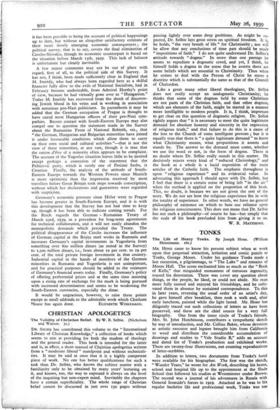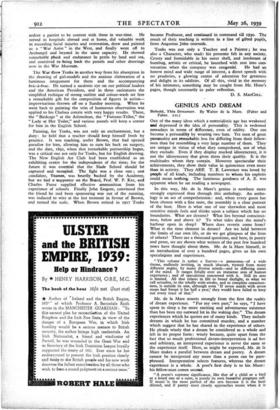TONKS
MR. HONE came to know his present subject when at work upon that perpetual attraction, irritation and comic puzzle to Tonics, George Moore. Under his guidance Tonks made a last excursion, a pilgrimmage, to "The Lake" and remains of Moore Hall. The scene enchanted him as much as the "Book of Kells," that misguided monument of tortuous ingenuity, roused his detestation. There was never any question about things, or the people, he liked, or could not abide. No man more fully earned and enjoyed his friendships, and he culti- vated them in absence by sustained correspondence. To this in later years, reversing the usual order of an artist's day, he gave himself after breakfast, then _took a walk and, after early luncheon, painted while the light lasted. Mr. Hone has diligently traced out such collections of letters as have been preserved, and these are the chief source for a very full biography. One from the inner circle of Tonks's friends, Mrs. St. John Hutchinson, contributes a sympathetic sketch by way of introduction, and Mr. Collins Baker, whose devotion as artistic executor and legatee brought him from California to weed and distribute the considerable accumulation of drawings and studies in "Vale Studio B," adds an account and dated list of Tonks's production and exhibited works. There are twenty-four illustrations, not counting reproductions of letter-scribbles.
In addition to letters, two documents from Tonks's hand were available for his biographer. The first was the sketch, "Wander Years," he wrote for Art Work, describing his home, school and hospital life up to the appointment at the Slade School that followed his studies at Westminster under Brown. The second was a journal of his adventures in Russia with General Ironside's forces in 1919. Attached as he was to his regular bachelor life and professional work. Tonks was too ardent a patriot to be content with these in war-time. He served in hospitals abroad and at home, did valuable work in recording facial injuries and restoration, drew and painted as a "War Artist" in the West, and finally went off to Archangel and beyond in the same capacity. He showed remarkable pluck and endurance in perils by land and sea, and contrived to bring back the pastels and other drawings now in the War Muscats.
The War -drew Tonks in another Way from his absorption in the drawing of girl-models and the anxious elaboration of a luminous integument for them and the accompanying bric-it-brac. He turned a sardonic eye on our political leaders and the American President, and in those caricatures the simplified techique of strong outline and colour-wash set free a remarkable gift for the composition of figures in action— improvisations thrown off on a Sunday morning. When he went back to painting the vein of humorous observation was applied to his Chelsea coterie with very happy results. These, the " Birdcage " at the Ashmolean, the "Fortune-Teller," the "Lady at Her Toilet," and various pastels will keep a corner for him in the English School.
Painting, for Tonks, was not only an enchantment, but a duty : he held that a teacher should keep himself fresh by practice. It was teaching, under Brown, that had opened paradise for him, allowing him to turn his back on surgery, and the date, 1892, when that remarkable partnership began, was a critical one not only for Tonks, but for English drawing. The New English Art Club had been established as an exhibiting centre for the independents of the time; for the future it was essential that the Slade School should be captured and occupied. The fight was a close one ; one candidate, Yeames, was heavily backed by the Academy, but we had a supporter on the Board, Prof. W. P. Ker, and Charles Furse supplied effective ammunition from his experience of schools. Finally John Sargent, convinced that the friend he had been sponsoring was out of the running, was induced to wire at the last moment in favour of Brown, and turned the scale. When Brown retired in 1917 Tonks became Professor, and continued in command till 1930. The result of their teaching is written in a line of gifted pupils, from Augustus John onwards.
Tonks was not only a Teacher and a Painter ; he was also a Character, who made his presence felt in any society, Crusty and formidable in his outer shell, and intolerant of humbug, artistic or critical, he launched with zest into cons versation when the company was congenial. He had an honest mind and wide range of interest, a direct speech with no pruderies, a glowing centre of adoration for greatness and delight in its oddities. Of all this, vivid in the memory of his intimates, something may be caught from Mr. Hone's pages, though necessarily in paler reflection.
D. S. MACCOLL.



























































 Previous page
Previous page